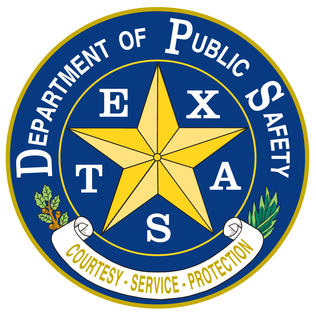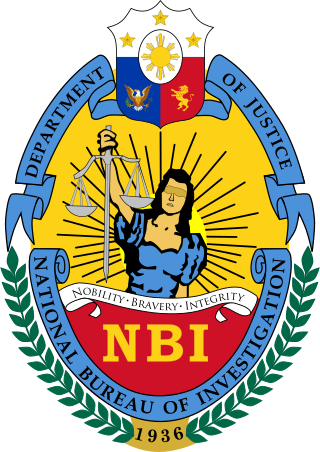
The Federal Bureau of Investigation (FBI) is the domestic intelligence and security service of the United States and its principal federal law enforcement agency. An agency of the United States Department of Justice, the FBI is a member of the U.S. Intelligence Community and reports to both the Attorney General and the Director of National Intelligence. A leading U.S. counterterrorism, counterintelligence, and criminal investigative organization, the FBI has jurisdiction over violations of more than 200 categories of federal crimes.

The Office of Management and Budget (OMB) is the largest office within the Executive Office of the President of the United States (EOP). OMB's most prominent function is to produce the president's budget, but it also examines agency programs, policies, and procedures to see whether they comply with the president's policies and coordinates inter-agency policy initiatives.

The Counterterrorism Division (CTD) is a division of the National Security Branch of the Federal Bureau of Investigation. CTD investigates terrorist threats inside the United States, provides information on terrorists outside the country, and tracks known terrorists worldwide. In the wake of the September 11 attacks in 2001, CTD's funding and manpower have significantly increased.

The United States Naval Criminal Investigative Service (NCIS) is the primary investigative law enforcement agency of the U.S. Department of the Navy. Its primary function is to investigate major criminal activities involving the Navy and Marine Corps, though its broad mandate includes national security, counterintelligence, counterterrorism, cyberwarfare, and the protection of U.S. naval assets worldwide. NCIS is the successor organization to the former Naval Investigative Service (NIS), which was established by the Office of Naval Intelligence after the Second World War.

The Department of Public Safety of the State of Texas, commonly known as the Texas Department of Public Safety (DPS), is a department of the state government of Texas. The DPS is responsible for statewide law enforcement and driver license administration. The Public Safety Commission oversees the DPS. However, under state law, the Governor of Texas may assume command of the department during a public disaster, riot, insurrection, formation of a dangerous resistance to enforcement of law, or to perform his constitutional duty to enforce law. The commission's five members are appointed by the governor and confirmed by the Texas Senate, to serve without pay for staggered, six-year terms. The commission formulates plans and policies for enforcing criminal, traffic and safety laws, preventing and detecting crime, apprehending law violators, and educating citizens about laws and public safety.

The Bureau of Diplomatic Security, commonly known as Diplomatic Security (DS), is the security branch of the United States Department of State. It conducts international investigations, threat analysis, cyber security, counterterrorism, and protection of people, property, and information. Its mission is to provide a safe and secure environment for officials to execute the foreign policy of the United States.

The National Security Branch (NSB) is a service within the Federal Bureau of Investigation. The NSB is responsible for protecting the United States from weapons of mass destruction, acts of terrorism, and foreign intelligence operations and espionage. The NSB accomplishes its mission by investigating national security threats, providing information and analysis to other law enforcement agencies, and developing capabilities to keep the US nation secure.

The National Bureau of Investigation is an agency of the Philippine government under the Department of Justice, responsible for handling and solving major high-profile cases that are in the interest of the nation.

The director of the Federal Bureau of Investigation is the head of the Federal Bureau of Investigation, a United States federal law enforcement agency, and is responsible for its day-to-day operations. The FBI director is appointed for a single 10-year term by the president of the United States and confirmed by the Senate. The FBI is an agency within the Department of Justice (DOJ), and thus the director reports to the attorney general of the United States.
Willie T. Hulon was the executive assistant director of the National Security Branch of the Federal Bureau of Investigation (FBI) until January 11, 2008. He was succeeded by Arthur M. Cummings, II.

The Terrorist Screening Center (TSC) is a division of the National Security Branch of the Federal Bureau of Investigation. It is the duty of the TSC to identify suspected or potential terrorists. Though housed within the FBI, the TSC is a multi-agency organization, including representatives from the United States Department of Justice, the United States Department of State, the United States Department of Homeland Security, the United States Department of Defense, the United States Postal Service, and various private contractors. It is located in Vienna, Virginia, near Virginia State Route 123.

The Bridgeport Police Department is the primary law enforcement agency in Bridgeport, Fairfield County, Connecticut, United States. It is responsible for most law enforcement within the geographical boundaries of City of Bridgeport, with the exception of:
Joseph M. Demarest, Jr. is an associate executive assistant director of the Federal Bureau of Investigation (FBI), and was formerly the assistant director in charge of the FBI's cyber division. He is responsible for the FBI's operations to protect the United States from cyber-based national security threats.
The Criminal, Cyber, Response, and Services Branch (CCRSB) is a service within the Federal Bureau of Investigation (FBI). The CCRSB is responsible for investigating financial crime, white-collar crime, violent crime, organized crime, public corruption, violations of individual civil rights, and drug-related crime. In addition, the Branch also oversees all computer-based crime related to counterterrorism, counterintelligence, and criminal threats against the United States.

The Science and Technology Branch (STB) is a service within the Federal Bureau of Investigation that comprises three separate divisions and three program offices. The goal when it was founded in July 2006 was to centralize the leadership and management of the three divisions. The mission of the STB is discover, develop, and deliver innovative science and technology so that intelligence and innovative investigation is enhanced.
The Human Resources Branch (HRB) is a service within the Federal Bureau of Investigation. The HRB is responsible for all internal human resources needs of the FBI and for conducting the FBI Academy to train new FBI agents.

The Counterintelligence Division (CD) is a division of the National Security Branch of the Federal Bureau of Investigation. The division protects the United States against foreign intelligence operations and espionage. It accomplishes its mission of hunting spies and preventing espionage through the use of investigation and interaction with local law enforcement and other members of the United States Intelligence Community. In the wake of the September 11, 2001 attacks, the division's funding and manpower have significantly increased.

The Intelligence Branch (IB) division of the Federal Bureau of Investigation (FBI) handles all intelligence functions, including information sharing policies and intelligence analysis for national security, homeland security, and law enforcement purposes. The IB operates through the use of embedded intelligence strategies.

The Criminal Investigative Division (CID) is a division within the Criminal, Cyber, Response, and Services Branch of the Federal Bureau of Investigation. The CID is the primary component within the FBI responsible for overseeing FBI investigations of traditional crimes such as narcotics trafficking and violent crime.














